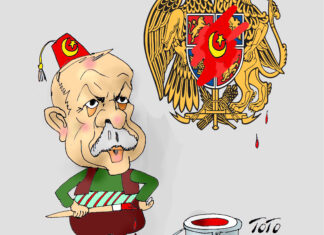‘You Will Burn in Hell’
By Ismail Akbulut
“You will burn in hell! Since you’ve committed treason, you’re no longer worthy to carry out God’s mission!” That’s a curse recently hurled at me by one of my own relatives, a Muslim Turk, in reaction to my latest op-ed: “Why I Am Grateful to Erdogan, the Dictator of Turkey” [Armenian Mirror-Spectator, November 4] My sin was to violate two of the most “sacred” narratives of Turkish mythology.
In the Islamic tradition, Muslims believe that there is life after death. Either one is cast into hell as a punishment for sins, or is granted access to pass through the gates of paradise. Obviously, no Muslim wants as his or her fate to spend eternity in hell. Why, then, would my own family member curse me with this fate instead of send me loving blessings? Here I will respond to some of the reactions to my previous article, and elaborate on why some believe I have committed blasphemy.
Many Muslims tend to believe that God was on their side during certain historical periods, because of their personal piety and work towards protecting Islam in general. Frankly, today most supporters of the Turkish president, Recep Tayyip Erdogan, believe that the Turkish-led Ottoman Empire was part of God’s divine mission, and they still grieve its defeat in 1922.
As some of my Turkish readers reminded me, in the official Turkish narrative held by many as sacred and inviolable, the Armenians were guilty for the collapse of the Ottoman Empire, the land protected and favored by no other than God himself. The multiethnic and religiously diverse Ottoman Empire, known for its relative tolerance vis-à-vis its minorities, entered WWI as an ally of the Central Powers. In this construction of history, Armenians, considered as the “trustworthy citizens” of the Ottoman Empire, collectively committed treason by rebelling and collaborating with the enemies, including the Russians and French, against the “holy” Ottoman Empire.








